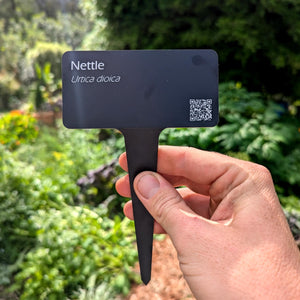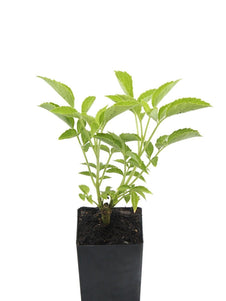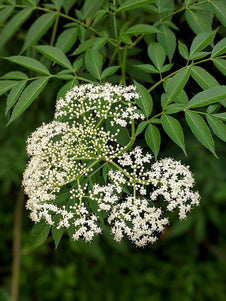













Elderflower
Elderflower

- Low stock - 17 items left
- Inventory on the way

Usually available: All year
Life cycle: Perennial
Height: 3 - 4m
Position: Sun / part shade
Soil preference: Well drained
This is how we pack and send your Herb Plants to all states except TAS & WA
You will receive
- 1 Elder Flower Herb Plant in a 50 X 75mm tube - General growing instructions
All of our Herb Plants are grown organically with certified organic potting mixes and fertilizers
Botanical Name: Sambucus canadensis
Elderflower, S. canadensis is also known as the North American elder and has been reclassified to a subspecies of S. nigra, along with the European or black elder. S.nigra is popularly cultivated in Europe and because the two varieties are so similar, the American elder is not cultivated commercially. It can be found growing naturally in wet, swampy areas across much of eastern and central North America and Canada.
As well as forming part of the edible garden, it can also be used as a feature plant in the garden. It grows 3 - 4m high. The dark green, compound leaves are pinnate or bipinnate with leaflets arranged oppositely around the stem, creating an overall length of up to 30 cm or more. Each leaflet has serrate edges, is quite large and may measure 3-12cm long by 2-6cm wide. The fragrant white flowers are large and bloom in inflorescences or clusters, about 30 cm in width. These are followed by the blue berry like fruits, but the plant may have both flowers and fruit for several weeks.
There are many uses for the fruit of the elderflower plant, as both a food and a health supplement. The many varieties of elder have been used all over the world for many centuries. Native Americans valued elderflower as a medicinal herb and used it to treat many conditions. Other uses included repelling insects and creation of a black dye from the bark.
Growing Conditions
Elderflower, or elderberry, is a vigorous, soft leafed deciduous shrub that can grow from 3-4 meters. The elderberry plant is quite adaptable to Australian conditions and will grow in most soil types, including wet soils. This plant likes full sun, but is happy to grow in part shade as well. After flowering, the fruit appears in late summer and the stems may droop under the weight of hundreds of small berries. Choose your position carefully, as this multi-stemmed plant suckers upwards and spreads. You may choose to grow it in a pot for this reason, or use a root barrier in the garden.
Medicinal Uses
Elderberry has a long history of medicinal use and although the American elderflower plant is not widely cultivated, research has indicated that there is great potential in its general health benefits. Elderberries have been found to have a high concentration of compounds known for their antioxidant activity and have greater potential health benefits than blueberries and cranberries. In addition, they have a much higher content of Vitamins A, C and B6 than other berries.
The traditional uses of elderflower plants involved the whole plant, with elderflower teas and tinctures made from the bark and fruit used for many ailments. Caution is advised using the raw plant products due to potential toxicity. However, elderflower has been used for a wide array of complaints such as stomach ache, constipation, diarrhoea and acts as a laxative and diuretic. However, most commonly the plant has been used as a topical application to treat fungal and bacterial infections, bruises, skin conditions, and as an anti-inflammatory application for wounds. Traditional uses also include for sore throats, coughs and respiratory infections, where it is thought to reduce swelling of mucous membranes. A tea to assist with cold and flu can be made by steeping 3-5 grams of dried elderflower in one cup of boiling water for 10-15 minutes. Strain the flowers off and then drink three times daily. It also combines well with peppermint and yarrow to make the popular blend YEP tea for colds and flu.
Culinary Uses
Elderberry has a bitter taste when uncooked and must NOT be used in its raw state. Uncooked berries and other parts of the elder family of plants contain cyanide inducing glycosides and can be extremely toxic. Caution is advised before using raw or dried fruits.
However, both the flowers and berries have a wide array of culinary uses. The flowers can be covered in batter and made into fritters, soaked in water to make a drink or dried flowers can be used to make a pleasant tea. The fruits are popularly cooked or made into syrups for pies, jams, jellies, sauces and other desserts. They can also be added to other food, such as bread rolls once made into syrup. Wine, beer and other drinks may also be made from the berries and the flowers used as decoration in desserts.
Elderberry syrup can be made from your own fruit and used on pancakes or added to water for a nice summer drink. Try this recipe: Take 1 cup each of water, fresh elderberries and granulated sugar and combine with ½ teaspoon each of ground cinnamon and nutmeg in a saucepan over medium heat. Bring to boil, stirring occasionally and then let simmer for 20 minutes, with occasional stirring. You can also try variations by adding honey or cloves to your taste.
All information provided on this website is for informational purposes only. Please seek professional advice before commencing any treatment.






